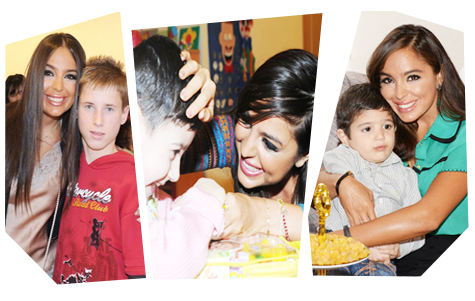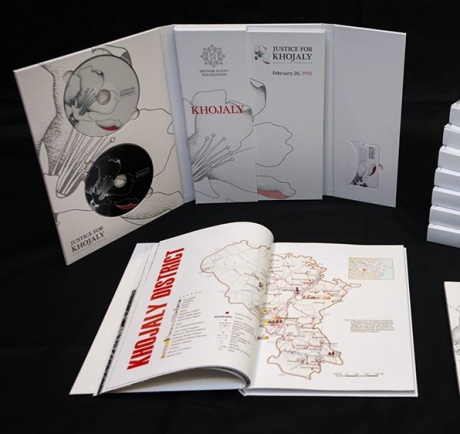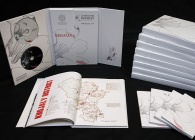
Family values are deep-rooted in Azerbaijan, and have been passed down from generation to generation since time immemorial. Care of youngsters, and respect for the elderly are cherished traditions in our country.

A new collection is published within the framework of the international campaign “Justice for Khojaly” following the initiative of Vice-president of the Heydar Aliyev Foundation Leyla Aliyeva. The collection entitled “Justice for Khojaly” made on the occasion of the 23rd anniversary of the Khojaly tragedy contains the true facts about the crime that took place on the night to the 26th February 1992.
The collection includes 2 DVDs with a documentary consisting of Leyla Aliyeva’s appeal in connection with the campaign “Justice for Khojaly”, massacre committed by Armenian armed forces and former Soviet army’s 366th motorized infantry battalion against peaceful citizens, and the genocide committed in Khojaly, a book, a booklet, as well as photos of the Khojaly events, a flash drive with a new logo of the campaign “Justice for Khojaly” and promotion products. The collection also contains an electronic presentation prepared in connection with Khojaly genocide. This ready presentation material will be used during various enlightening events, in particular, it will be widely used for the foreign audience.
In the video-appeal by Leyla Aliyeva, attention is drawn to the Khojaly genocide as one of the most tragic events occurred in the 20th century that the world society had difficulty to prevent, and informs of the details of this event committed as a result of the aggression by Armenia against Azerbaijan, the conditions it had occurred in, and its grave results. Urgency of ensuring justice for the acts committed is emphasized in the appeal and significance of increasing endeavours of the world society towards recognizing the Khojaly genocide in recent years, including resolutions passed by legislative bodies of a number of states were underscored from this standpoint.
“At the beginning of the 1990s Azerbaijan faced military aggression from its neighbour Armenia, which even now continues to occupy 20% of the Azerbaijani territories. The war that followed this aggression took 30 thousand lives, nearly one million Azerbaijanis became refugees and internally displaced persons, while thousands of people disappeared without a trace. In the course of this Armenian aggression, the most serious international crimes were committed against Azerbaijan and its population; a small Azerbaijani town of Khojaly became the victim of the most terrifying and shocking crimes of this conflict”, Leyla Aliyeva said in her appeal to the world society.
“The Khojaly Genocide exposed the perpetrator’s brutality. It also revealed the bravery and heroism of the people of Khojaly who risked their lives to save friends and neighbours from the massacre. We must summon the same courage to bring the perpetrators to justice, to ensure that such mass atrocities and genocides never happen again. It is wrong that even though more than two decades have elapsed, no one has yet been convicted for the ferocious crimes committed in Khojaly. Impunity for the acts committed remains a major stumbling block for maintaining justice and achieving peace in the region.
Fortunately, in recent years a number of foreign nations have spoken up and supported our campaign to gain international recognition of the Khojaly Genocide. Legislative bodies in numerous countries have officially recognized the Khojaly Genocide. This support encourages us to continue our path of campaigning for the truth and relieving our sorrow. It also gives us hope that justice will be established and the perpetrators will be held accountable for their actions. We are thankful for this global support and hope that once people hear about the tragedy more nations will join our campaign for justice.
I ask you to join our campaign, to spread the truth about this tragedy in your own country so that together we can ensure that these acts never happen again! I believe that with your support justice for the Khojaly will be restored!” - said Leyla Aliyeva.
In the documentary included in the collection, similarity of Khojaly genocide with other genocides recognised in the world is shown, and information and maps on the commission, scale and results of the genocide are presented.
In a book and a booklet entitled “Justice for Khojaly”, photos describing the tragedy and facts related to the bloody crimes committed on that night are introduced. Legal assessment of the acts committed in Khojaly and international legal grounds for the responsibility of Armenia and its officials are explained. Moreover, mass media that had covered the Khojaly genocide, countries recognizing this crime as a genocide, as well as works carried out in the framework of the campaign “Justice for Khojaly” are also presented in the book.
In the collection, a new logo of the campaign “Justice for Khojaly” also is presented. The logo of the campaign pictures a broken branch of an almond tree blossoming in February, symbolizing unfinished destinies in Khojaly. It should be noted that almond is the first tree to start blossoming. As the almond tree blossoms at the end of winter, most people considers it as a herald of spring. The almond flower on the logo reflects the hope for securing justice in relation to the genocide committed in February 1992 in Khojaly, an ancient habitat of Daghlyg Garabagh region of Azerbaijan, and non-recurrence of such ferocious acts. A broken petal shows the occupied 20 per cent of the Azerbaijani territory.
Published in the English and Russian languages, the collection “Justice for Khojaly” will be presented in other languages too in future. This collection will also be as a visual aid for those who want to introduce Khojaly tragedy to the world.
Let us recall that the campaign “Justice for Khojaly” was launched in 2008 at the initiative of Vice-president of the Heydar Aliyev Foundation Leyla Aliyeva. Objective of the campaign was to introduce the true facts about Khojaly genocide to the world, and seek recognition of this tragedy as a genocide against the people of Azerbaijan. To date, events related to this tragedy were held in over 70 countries of Europe, Asia, Africa, North and South America. Within the framework of these events, acts of protest, pickets were held before parliaments and state entities of various courtiers, as well as seminars and conferences organized, books published and films shot. Due to the campaign “Justice for Khojaly”, Khojaly tragedy was recognized by a number of states and international organizations.
A link to a new documentary called “Justice for Khojaly”:
https://www.youtube.com/watch?v=ExfVQBJAIAU


